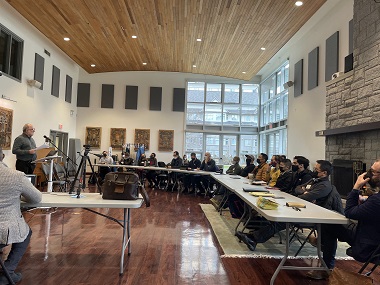
Teams of local church leaders meet at St. Andrew’s Hall for the Certificate in Missional Leadership.
Creating Conversation is a weekly editorial, curated by the Centre for Missional Leadership, that gives opportunity for people to speak about issues they believe are vital for the church in Vancouver.
One of the goals of this weekly article is to spark dialogue – and action.
We invite you to join the dialogue here on the Church for Vancouver website. We also invite you to use the article as a discussion starter with your small group, church staff, friends and your neighbours. Thanks for participating in the conversation!
Many churches are facing a crisis of survival. The Covid pandemic has exposed and accelerated the need for shifts in our models of church developed during Christendom.
Major transitions are now required for churches not only to survive, but to bear witness more fully to the transforming work of God in Christ and by the Spirit in what Canadian Catholic philosopher Charles Taylor describes as our ‘Secular Age’ (A Secular Age, Harvard Press, 2007).
Most seminaries have responded to this need for transition in churches by educating people to take up pastoral roles in churches, people who will be equipped to help churches make these changes. Preparation of such leaders remains vital.
However, many seminaries are also recognizing that these required transitions call for education and formation of the whole people of God.
As a result, more seminaries are turning to working with leadership teams rather than just individuals. Working with an entire leadership team from a particular church resources an entire group of leaders who can both contextualize their learning in their own congregations and discern together some specific transitions that the Spirit is leading their church towards.
Two local theological institutions taking up this opportunity to equip a team of leaders from a particular church include Regent College and St. Andrew’s Hall.
Regent Exchange
Regent Exchange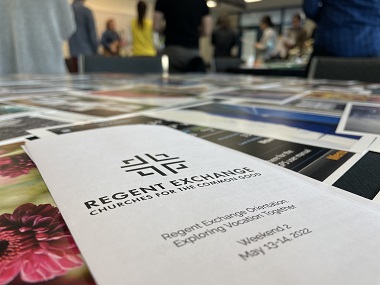 is a fresh expression of Regent College’s longstanding commitment to integrative theology that embraces all of life.
is a fresh expression of Regent College’s longstanding commitment to integrative theology that embraces all of life.
Led by Dr. Rhonda McEwen, Regent Exchange is a church partnership and educational research initiative that consists of three areas of focus.
First, this initiative invites churches on a learning journey, which takes place both within a single congregation through a freshly formed church learning team, and in the midst of a small group of other churches teams which come together to form a cohort.
Within these cohorts, church learning teams discern how God might be calling their congregation to serve the common good. Churches are then supported through resources and grant funding to initiate a new ministry experiment.
Second, church cohorts are offered access to Regent’s numerous theological resources, including on the theme of vocation and calling, and more broadly.
Third, Regent Exchange fosters research on this vital question: How do churches in Cascadia discern and experience (understand and incarnate) their vocation in the communities where they live and work? Put another way, Regent Exchange is deeply interested in the learning process of churches, and how a church discovers its corporate calling to contribute to the common good.
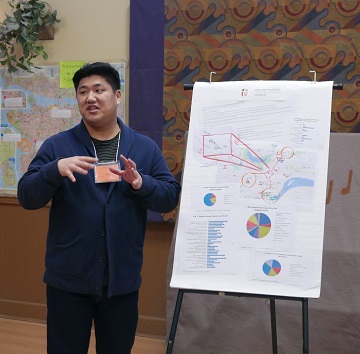
Hyung-Jun (Jun) Kim from New Westminster Christian Reformed Church was part of the first Regent Exchange cohort.
Regent Exchange cohorts are composed of up to 10 churches who engage in a 12-month Learning Journey. Each church is represented by a team of four to eight members who are committed to discover, discern, design and implement ministry experiments that deepen their congregation’s understanding of vocation and calling in practical ways.
The third cohort began in May. Each cohort is guided through learning tasks, peer groups and coaching, towards experimenting in a new ministry area. These ministry experiments can be anything from helping individual church members reflect on their vocations in light of God’s story to mobilizing a whole church to meet a particular need in its neighborhood.
One church, for example, created and hosted an outdoor craft fair in their parking lot during Covid. Another church initiated a variety of creation care initiatives, including a nature program for children, while a third has developed a program for engaging with marginalized neighbors. Others have revitalized their physical assets for the benefit of their local communities.
For more information on Regent Exchange, go here.
Certificate in Missional Leadership
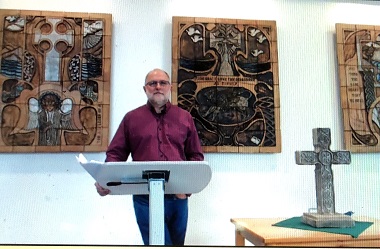
Tim Dickau teaching at St. Andrew’s Hall.
The Certificate in Missional Leadership at St. Andrew’s Hall also aims to equip leadership teams from churches, in their case over a two-year period. The first year involves four Saturday mornings of learning with both theologians and practitioners.
The focus of this first year is on:
a. understanding our secular age and the misshaping forces in our culture that make being the church difficult.
b. forming thicker and more porous communities of formation in Christ.
c. and more deeply engaging our neighbourhoods and cities with an eye towards personal and systemic transformation.
The second year involves a ministry project that will engage their neighbourhood more deeply as well as furthering their own formation in the process. Previous projects include engaging local First Nations in learning about reconciliation, exploring the development of affordable housing and redesigning the outdoor space of the church building with neighbours.
The team at the Centre for Missional Leadership – which includes Albert Chu, Ross Lockhart, Andrea Perrett and Darrell Guder and myself – brings a wide-ranging pastoral experience to both mentor and consult with these church leadership teams over the course of the two years.
The CML has completed one full cohort of more than 60 people and is beginning a new cohort this September. For more information and registration, go here.
Longer-term formation required
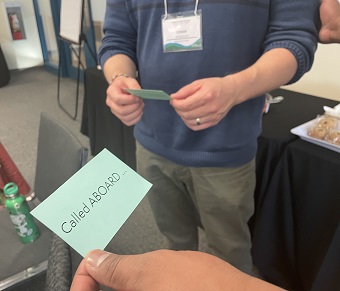 Both these initiatives in equipping leadership teams reflect the need for longer-term thinking and formation for churches. Quick fixes associated with pre-packaged programs are proving ineffective for meaningful congregational transitions in our post-Christendom context.
Both these initiatives in equipping leadership teams reflect the need for longer-term thinking and formation for churches. Quick fixes associated with pre-packaged programs are proving ineffective for meaningful congregational transitions in our post-Christendom context.
What these programs recognize is that for churches to become fresh expressions of salt and light in their neighbourhoods requires a longer-term formation and engagement. These programs also recognize that if churches are going to bear witness to the reconciling and restoring work of God, they need a long-term vision that holds together personal, congregational and societal transformation in Christ and by the Spirit.
Both these initiatives seek to develop long-term relationships with churches to accompany them towards this sort of vision.
Coming out of the pandemic, many churches are searching for ways to re-form their own congregations and re-engage their neighbourhoods. Both these programs offer the opportunity to learn and act together with other leaders from your church to embrace God’s leading in these uncertain times.
Might you collect a team of leaders from your church to engage in this collective learning and by doing so help your church transition towards greater participation in the renewing work of God?
Tim Dickau teaches through the Centre for Missional Leadership at St. Andrew’s Hall and directs CityGate Vancouver. Before that he served as a pastor with Grandview Church for three decades.
